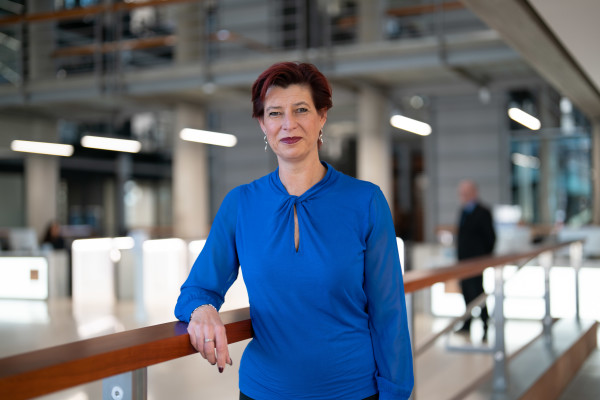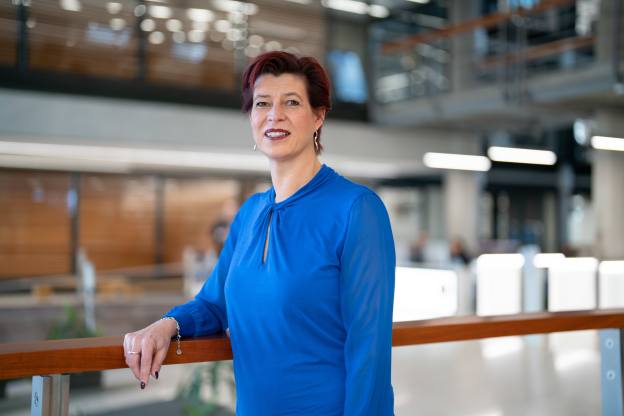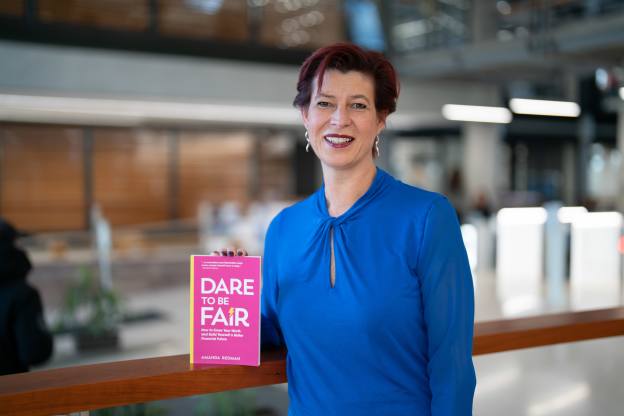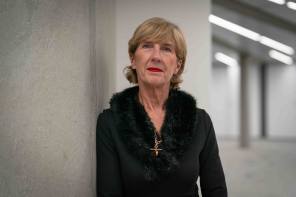

Deciding to become a financial adviser was not a career step that Amanda Redman took lightly. In fact, she called it a "significant" step - a leap of faith almost.
But the founder of Tonbrige-based Amanda Redman Financial Planning, and who was named as the Best Woman in Financial Services at the national Best Business Women Awards 2020, says she has never looked back wistfully on her previous corporate career.
She says: "I was previously a European marketing director with a 21-year corporate career, so when I knew I wanted to pursue a new path of helping people on an individual basis, it was a very deliberate and well-researched move into the industry.
"I took a significant step when I chose to completely change my career and re-train as a financial adviser, and it was not one that I took lightly."
So what prompted this move?
Redman says: "It was a desire to advise, inform and support women like myself: professionals, who are working mothers and have a lack of time (and often inclination) to manage their own personal finances.
"In an industry with a historically low percentage and representation of women, I felt I could make a positive and tangible difference to people’s lives.
"By being relatable and empathetic to their circumstances, I build strong, supportive relationships that gives them confidence with their money, enabling them to take control of their financial future."
Pursuit of professionalism
Redman expresses her gratitude for the wealth management firm that supported her company, Amanda Redman Financial Planning. She says: "They provided the support, training and professionalism needed to help me develop and grow as a financial adviser – at the start and ever since.
"Now, I am skilled in giving high-quality advice across a range of needs, including complex and high-net-worth situations.
"After five years, I passed the advanced Chartered Insurance Institute exams and became a chartered financial planner, enabling me to focus on creating plans for clients that give them confidence in their financial future, to live their best possible life.
According to Redman, being self-employed is good for women as it means there are "no tangible barriers to entering the profession on this basis" - it's purely a "meritocracy where earnings are created through your own skills and hard work".

But she acknowledges that traditional beliefs and expectations can cause barriers in women’s minds as to whether they will ‘fit’ or succeed in the financial services industry.
Therefore, she is keen to promote her profession, because "as a career it can provide high job satisfaction alongside the flexibility to work the hours you want to, aligned to your clients’ needs.
"Ultimately, the more women who enter the profession, the more representative it will be of the clients we serve – and with it, the stereotype of older, white male advisers should lessen."
Adapting and evolving
In addition to these perceived barriers, Redman believes the language used in financial services is still skewed to a largely male 'audience'. She explains: "The language used within financial services is certainly an issue.
"It’s ‘male’ in the sense that it has been created and evolved by men, who have always dominated the industry, and it remains full of jargon and technical-speak.
"That’s why I ensure the advice I give my clients is clearly expressed in a way they can understand."
This is not to say that her clients lack basic financial knowledge. Quite the opposite, in fact. Redman says: "The clients I work with are all intelligent people — many of them are C-suites, so finance directors and chief executives themselves.
"However, sometimes the language can be impenetrable, particularly so in regulatory documents."
She says the effect of this can make people feel overwhelmed and concerned that they don’t understand their finances sufficiently.
In fact, Redman's experience is that her female clients are more likely to ask questions when they do not understand financial terminology: "Women tend to be more likely to admit when they don’t understand or feel confused about a topic than men are, but I know that this is a shared experience.
"Men sometimes feel pressured to give the appearance they understand finance in its entirety, while women often feel that it’s ‘not for them’ and it is not something they should take an active interest in."
That said, she believes more needs to be done to eliminate jargon from financial services for everyone.
Redman explains: "When they find themselves having to make big or difficult decisions about their money, they can feel alienated by the complex terminology, which can undermine their confidence."
She expresses a wish for the Financial Conduct Authority to do more. She says: "The FCA has a responsibility to improve the way in which information is explained and expressed, so that people can genuinely understand it and feel informed about the decisions they are taking – whatever their circumstance, education, gender or background."
Diversity of thought and the achievement of goals
So what sort of things do her clients value and how does having a diverse team help them achieve their goals?
Redman says: "As many of my clients are professional women, there is definitely a benefit to them of being able to discuss the challenges and aspirations they are facing with their finances with someone who has had similar life experiences and can empathise with their circumstances.
"I am very open about the difficulties I faced in becoming financially confident and finding the balance between being a mother and a professional businesswoman in a corporate environment.
"This led me to write my book, Dare To Be Fair – how to know your worth and build yourself a better financial future, to change the narrative and inspire women to do the same for themselves."
This Amazon best-selling book, highlights the financial inequalities that women can face in their lifetime, with ideas and practical tips on how to overcome them, both in the workplace and with their personal finances.

She adds: "The feedback I received following its release was enlightening: just how many women felt similarly trapped, lacking in confidence and undervalued.
"The book has provided a starting point from which they can strive for change and improve their financial situation now and in the future.
"With my financial planning team, I cannot be more thankful for the people I have supporting me. They span across a wide age range and come from different backgrounds."
For Redman, this is important because it means the company can relate to and attract a wide range of clients, giving them a tailored approach to finance that is suitable for their needs.
She adds: "It is a core value of my business that we take time to get to know the personal circumstances and goals of our clients, to give them the advice and service they deserve, and to support them on their journey to taking control of their finances.
"Our mission at Amanda Redman Financial Planning is to empower our clients to become confident financial decision-makers as a result of how we work with them. We want to enable them to make the most of their money and live their best possible life.
"This is ultimately what our clients value and need – knowing how best to save and invest for security in later life, as well as how to spend and enjoy what they have earned."
For example, being able to tell a client that they can retire early and have what they need for them and their family throughout their life is hugely rewarding.
The same is true when the team works with women going through divorce, or who are recently bereaved – "these are times when a trusted relationship is usually as important as the financial advice we are giving", she adds.
More is needed
During Redman's corporate career, she ran a Gender Diversity workstream for three years to improve female representation at senior levels.
This helped her gain a lot of experience as to how this can be achieved. She says in her experience, diversifying must be done with intent. "It won’t automatically happen, because the starting point is not equal, whether that’s in terms of gender, age, or ethnicity."
She says of firms understand the business case for diversity – which one would assume most do nowadays – then they have to act accordingly. This means two things, in essence:
- Making sure they get the right diversity of applicants for new roles from which to choose
- Ensuring the company culture provides equitable (not equal) opportunities for all underrepresented groups to flourish and succeed at all levels of the organisation.
Redman continues: "Women have specific challenges because of the ‘motherhood penalty’. Re-entering the workplace after maternity leave, or a career break, continues to be challenging when really it shouldn’t be.
"Employers should embrace the skills women perfect whilst raising children: multi-tasking, prioritising, quick decision-making – all skills that are highly valued at work, but are overlooked if developed outside the workplace.
Advice as a profession and a calling
For Redman, the benefits of being a self-employed financial adviser are the flexibility of being your own boss, running your own business, setting your own hours and operating your own quality control to a high standard.
This should be attractive to anyone - not just to women.
Moreover, Redman points to the ‘well-being’ factor of making a genuine difference to people’s lives, while being respected as an expert who knows which solutions are right for clients' unique circumstances.
She adds: "Giving good advice and empowering clients with a plan to help them achieve their best financial future is good for the soul and are benefits that women will instinctively recognise and appreciate.
"If I can be a role model to inspire women to take control of their finances and be as financially self- sufficient as possible, I can also be a role model for what female success in this profession looks like."
Biography:
After an extensive and successful career as a senior director in international business and marketing, Amanda Redman established her company, Amanda Redman Financial Planning.
She was delighted to join a national wealth manager in 2013 as a partner practice.
Amanda is a ension planning specialist and enjoys working with female clients, who often have few financial planners to choose from who can relate to their personal circumstances and experiences.
She was also named Best Woman in Financial Services in the national Best Business Women Awards 2020.



